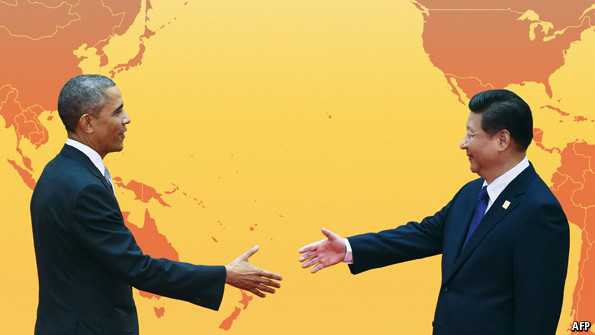Bridge over troubled water
This week’s summit in Beijing helped, but great-power rivalry still threatens the Pacific
Nov 15th 2014
.

IN CHINA even a handshake is an expression of power. When Xi Jinping met Barack Obama in Beijing this week at the Asia-Pacific Economic Co-operation (APEC) summit, Mr Xi stood on the right, his body open towards the cameras in an attitude of confident strength. The visitor was required to approach him, as if paying tribute, from the left, shoulder defensively towards the photographers. These days, from the smallest details of summit choreography to the biggest global issues, the rivalry between China and America trumps everything.
On the face if it, diplomacy triumphed this week. There was an even more momentous handshake—the long-awaited, reluctant one between Mr Xi and Shinzo Abe, the Japanese prime minister, which signalled a lowering of tensions over disputed islands. Mr Xi and the president of the Philippines, Benigno Aquino, had a “meeting of minds” over a separate maritime matter. China and South Korea agreed a trade deal of their own. And America and China made real progress on climate change, visas, trade and security. Compared with the torpor and occasional ill-temper of previous APEC summits, this was visionary stuff , and the summitry is now moving on to Myanmar and Australia. The trouble is that all this is only a first step in diffusing the tensions in the Pacific created by the rise of China and America’s relative decline.
I’m sailing right behind—in a gunboat
Richard Nixon’s visit to Beijing in 1972 was celebrated because it aligned America and China against Soviet Russia. But it also signalled China’s willingness to help America end the Vietnam war, and thus to tolerate an Asian pax Americana. Those days are now at an end.
China’s economy will soon overtake America’s to become the world’s largest. China is once again in league with Russia—on November 9th the two signed another huge gas deal. In a head-on war China’s armed forces would be no match for America’s. But their growing strength will increasingly keep America at arm’s length, prevent it from protecting Taiwan and pose a threat to its bases in South Korea and Japan. Mr Xi could not have been clearer when he declared, earlier this year, “It is for the people of Asia to…uphold the security of Asia.”
China’s growth is not the only reason for change. As our special report in this issue sets out, the Pacific rim as a whole has become too prosperous and too complex for the ocean to be either America’s lake or China’s. The Asian middle class has increased sevenfold since 2000. In Latin America, by contrast, it has merely doubled. Asian countries, including South Korea, have become influential actors in world trade. America is their chief ally and China their largest trading partner.
They do not want to be satellites of either.
Unfortunately, pax Americana is giving way to a balance of power that is seething with rivalry and insecurity. Everywhere China sees American plots designed to prevent its rise. American alliances contain it, foreign-funded NGOs undermine the Communist Party, and spies foment protests in Hong Kong and among the Uighurs in Xinjiang. In August a Chinese fighter-jet and an American surveillance plane passed within 20 feet, just avoiding a mid-air collision.
Perhaps because Mr Xi and Mr Obama understand that this could have plunged the two superpowers into crisis they pledged this week to improve military communications. Smaller countries, for their part, are alarmed by Chinese bullying—especially over disputed claims to rocks, shoals, reefs and sandbanks around China’s coastline. Chinese high-handedness drove Myanmar towards the West and provoked anti-China riots in Vietnam this year. Asia is arming itself. In the five years to 2013 it accounted for 47% of global weapons imports, up from 40% in 2004-08.
America, naturally, wants to maintain the status quo. Mr Obama, who grew up in Hawaii, stressed this week that his is a “thoroughly Pacific nation”. But American diplomacy is at best distracted and at worst divisive. Rhetoric about “pivoting” and “rebalancing” towards Asia was meant to reassure America’s allies; instead it fed Chinese paranoia. China appreciates Western-inspired rules in commerce. But America’s ambivalence over whether China will one day be welcome to join its grand trade deal, the Trans-Pacific Partnership (TPP), has allowed even that to become a source of tension.
As China grows, it deserves a bigger role in international institutions, yet Congress has blocked reforms to give China more clout in the IMF.
All this has encouraged China to set up its own clubs—its own trade deal, its own development bank and its own regional-security grouping. The bank may be useful, but this approach will not serve China well. Global institutions such as the world trading and financial systems, freedom of navigation and international action on climate change are vital for the country’s prosperity. China weakens them at its peril.
All your dreams are on their way
Nineteenth-century Europe discovered how difficult it is to use the balance of power to keep the peace. For decades it laboured to absorb the rise of Wilhelmine Germany and Imperial Russia, and the decline of Austria-Hungary, before succumbing to war in 1914 in a fit of nationalistic fervour. A lot of blood had to be spilled before the Atlantic countries understood that institutions—NATO, the UN and even the unloved European Union—are needed to shore up international relations. Let us hope that the Pacific, cradle of so many of the world’s hopes, can reach that understanding by peaceful means.
0 comments:
Publicar un comentario